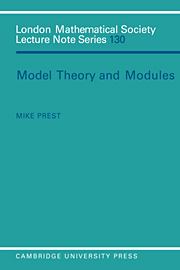Book contents
- Frontmatter
- Contents
- Introduction
- Acknowledgements
- Notations and conventions
- Remarks on the development of the area
- Section summaries
- Chapter 1 Some preliminaries
- Chapter 2 Positive primitive formulas and the sets they define
- Chapter 3 Stability and totally transcendental modules
- Chapter 4 Hulls
- Chapter 5 Forking and ranks
- Chapter 6 Stability-theoretic properties of types
- Chapter 7 Superstable modules
- Chapter 8 The lattice of pp-types and free realisations of pp-types
- Chapter 9 Types and the structure of pure-injective modules
- Chapter 10 Dimension and decomposition
- Chapter 11 Modules over artinian rings
- Chapter 12 Functor categories
- Chapter 13 Modules over Artin algebras
- Chapter 14 Projective and flat modules
- Chapter 15 Torsion and torsionfree classes
- Chapter 16 Elimination of quantifiers
- Chapter 17 Decidability and undecidability
- Problems page
- Bibliography
- Examples index
- Notation index
- Index
Chapter 17 - Decidability and undecidability
Published online by Cambridge University Press: 15 December 2009
- Frontmatter
- Contents
- Introduction
- Acknowledgements
- Notations and conventions
- Remarks on the development of the area
- Section summaries
- Chapter 1 Some preliminaries
- Chapter 2 Positive primitive formulas and the sets they define
- Chapter 3 Stability and totally transcendental modules
- Chapter 4 Hulls
- Chapter 5 Forking and ranks
- Chapter 6 Stability-theoretic properties of types
- Chapter 7 Superstable modules
- Chapter 8 The lattice of pp-types and free realisations of pp-types
- Chapter 9 Types and the structure of pure-injective modules
- Chapter 10 Dimension and decomposition
- Chapter 11 Modules over artinian rings
- Chapter 12 Functor categories
- Chapter 13 Modules over Artin algebras
- Chapter 14 Projective and flat modules
- Chapter 15 Torsion and torsionfree classes
- Chapter 16 Elimination of quantifiers
- Chapter 17 Decidability and undecidability
- Problems page
- Bibliography
- Examples index
- Notation index
- Index
Summary
This chapter is concerned with the question: for which rings R is the theory of R-modules decidable? That is, for which rings is there an effective way of deciding whether or not a given sentence is true in every module?
The first section begins with some definitions and discussion, for the benefit of those unfamiliar with decidability questions. Then it is noted that since, for instance, the word problem of a ring is interpretable within the theory of its modules, we should impose some minimum conditions on the ring before the question: “is the theory of modules decidable?” becomes a reasonable one. I suggest such a condition: one should be able to tell effectively whether certain systems of linear equations have solutions in the ring. It is noted that a ring of finite representation type has decidable theory of modules (assuming it satisfies this condition). It is also shown that decidability of the theory of modules is preserved by “effective Morita equivalence”.
If the word problem for groups is interpretable within the theory of R-modules, then that theory is undecidable. In §2 we use this fact to establish undecidability of the theory of modules over a variety of rings. It is conjectured that any ring of wild representation type has undecidable theory of modules.
In the third section, we turn to decidability. Although the first decidability results were proved “with bare hands”, all present results may be achieved by giving an explicit description of the topology on the space of indecomposable pure-injectives. By a result of Ziegler, that is enough to establish decidability of the theory of R-modules.
- Type
- Chapter
- Information
- Model Theory and Modules , pp. 332 - 349Publisher: Cambridge University PressPrint publication year: 1988

